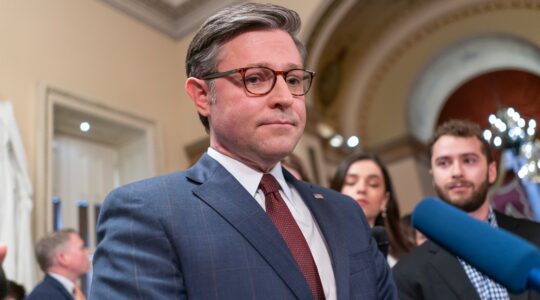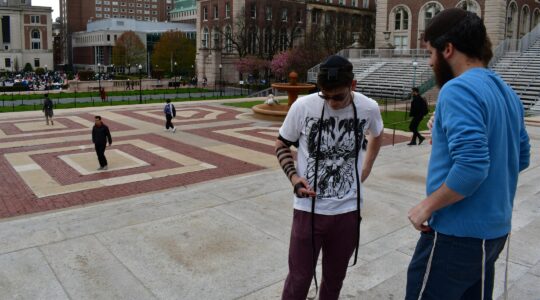The president and CEO of the United Jewish Communities will not seek another term in office after his current term is up in August 2009, the Fundermentalist has learned.
Howard Rieger took over the top professional position at the umbrella organization for the North American Jewish federation system in 2004, after spending more than two decades as the president of the United Jewish Federation of Greater Pittsburgh. His his contract with UJC ends in August of 2009, and he has decided that he will not seek renewal of the contract, according to sources close to the situation.
Rieger, 65, was informing the UJC’s worldwide professional staff in a meeting and conference call this morning.
His term at UJC has been one of tumult and tough decisions as the organization has been under intense pressure from the federations it serves to reduce the dues that they pay. This has led to several rounds of budget cuts and layoffs.
He has also overseen an overhaul of the organization’s structure and strategic direction – as well as several highly successful emergency campaigns for Israel and natural disasters that have raised hundreds of millions of dollars.
Though he has his detractors within the federation system, Rieger is not being forced out, according to our source. Otherwise, he would not be given another year in office.
“Rieger feels he has made significant changes over a tough time and he wants to leave the organization in good shape for his successor, and wants to spend the next year doing even more – and possibly being even tougher,” said the source.
A search for a replacement will begin immediately.
Story developing…
Updated:
The UJC just posted the Reiger news on its website.
UJC’s President and CEO Howard Rieger said today that he will depart the organization when his five-year contract ends on August 31, 2009, and also announced the launch of a succession plan.
UJC Board of Trustees Chair Joe Kanfer has asked UJC Executive Committee Chair Kathy Manning to lead a search committee to select a successor to Rieger. The search committee will be formed in the near future.
“When I made the same announcement in Pittsburgh during the summer of 2003, I knew that we were positioned for someone to succeed me and bring the United Jewish Federation to the next level of accomplishment,” Rieger told a UJC staff meeting.
For the rest of the announcement, click here:
“Little did I know then that, during the fall of 2004, I would assume the top professional position at UJC. Once again, I think that the organization that I am charged with directing is ready to build on our accomplishments to date.”
During his tenure, Rieger oversaw an organizational restructuring of UJC along with the development of a strategy for the UJC/Federation system. “The fact that a strategic planning process is being launched this same week for UJC and the continental federation system will position UJC to bring on a new CEO with an agreed-upon approach to help UJC and federations meet the challenges of the 21st century,” he said.
UJC under Rieger also spearheaded the $360 million Israel Emergency Campaign in response to the Second Lebanon War, the nearly $30 million Hurricane Katrina disaster relief effort, and Operation Promise, which raised more than $70 million for poor elderly and young Jews in the former Soviet Union and to resettle Ethiopian Jews in Israel.
The IEC also initiated a new collaborative process with UJC’s main overseas partners, the Jewish Agency for Israel, the American Jewish Joint Distribution Committee, the Ethiopian National Project, the Israeli government and other Israeli groups, to identify emergency and post-war rebuilding needs. So too with the Hurricane Katrina response, which saw pro-active disaster relief planning before the storm hit, and has produced a series of community building initiatives recognized throughout the Gulf Coast.
The UJC/Federation system also saw increases in fundraising, culminating in a record nearly $900 million Annual Campaign in 2008, with the federation system raising some $2.4 billion total resources during the last year.
“We have built a tremendous team here, even as we have gone through challenging times,” Rieger said. “We have people on board who can lead us, a strategic plan in the making, and by the end of the year a move to a new headquarters, and it seemed like the perfect time for me to hand off the ball to a new CEO who I hope will be able to devote a substantial portion of a career to building our continental system.”
In addition to the organization’s key accomplishments, Rieger said he was particularly proud of the leadership team of professionals and lay leaders in place.
“This team already has demonstrated the capacity to create a collaborative environment, in which colleagues are empowered to step up to new challenges and responsibilities, to lead the system into the future.”
One recent example of UJC staff impact, he said, was the just-completed Campaign Chairs & Directors Mission to Poland and Israel. UJC staff who led the mission received “not one but two standing ovations” from the participants, “all of that for a new team that had never led such a venture. That is a vote of confidence in our staff, something which makes me so proud.”
Rieger, a native of Chicago, came to UJC from Pittsburgh, joining UJC in the fall of 2004, after 23 years as president of the United Jewish Federation of Greater Pittsburgh. There, he led such major initiatives as a Soviet Jewry resettlement effort that raised one of the highest per-capita amounts nationwide, the restructuring of the relationship between the federation and its foundation, the launch of a worldwide Jewish communal training program with the JDC, one of the first successful community wide capital campaigns, which raised $55 million, and in his final year there, a total financial resource development achievement of $35 million.
Rieger, paraphrasing the words of the Jewish sage Hillel, said UJC ultimately demonstrates that there is an imperative for a bold and innovative continental Jewish federation collective system, because “we’ve got to be for more than our own community – we’ve got to be for the broader needs that extend beyond our borders.”
“In that sense it is a responsibility of all of us, to figure out how to maximize the impact of our work. If during the last four years and the year to come we will have made any progress on that road, and I feel that we have, then my time at UJC will have been well spent,” he said.
“Serving the Jewish people for the last 39 years since joining the Jewish Community Federation of Cleveland at the entry level has been an honor and a privilege,” Rieger added.





